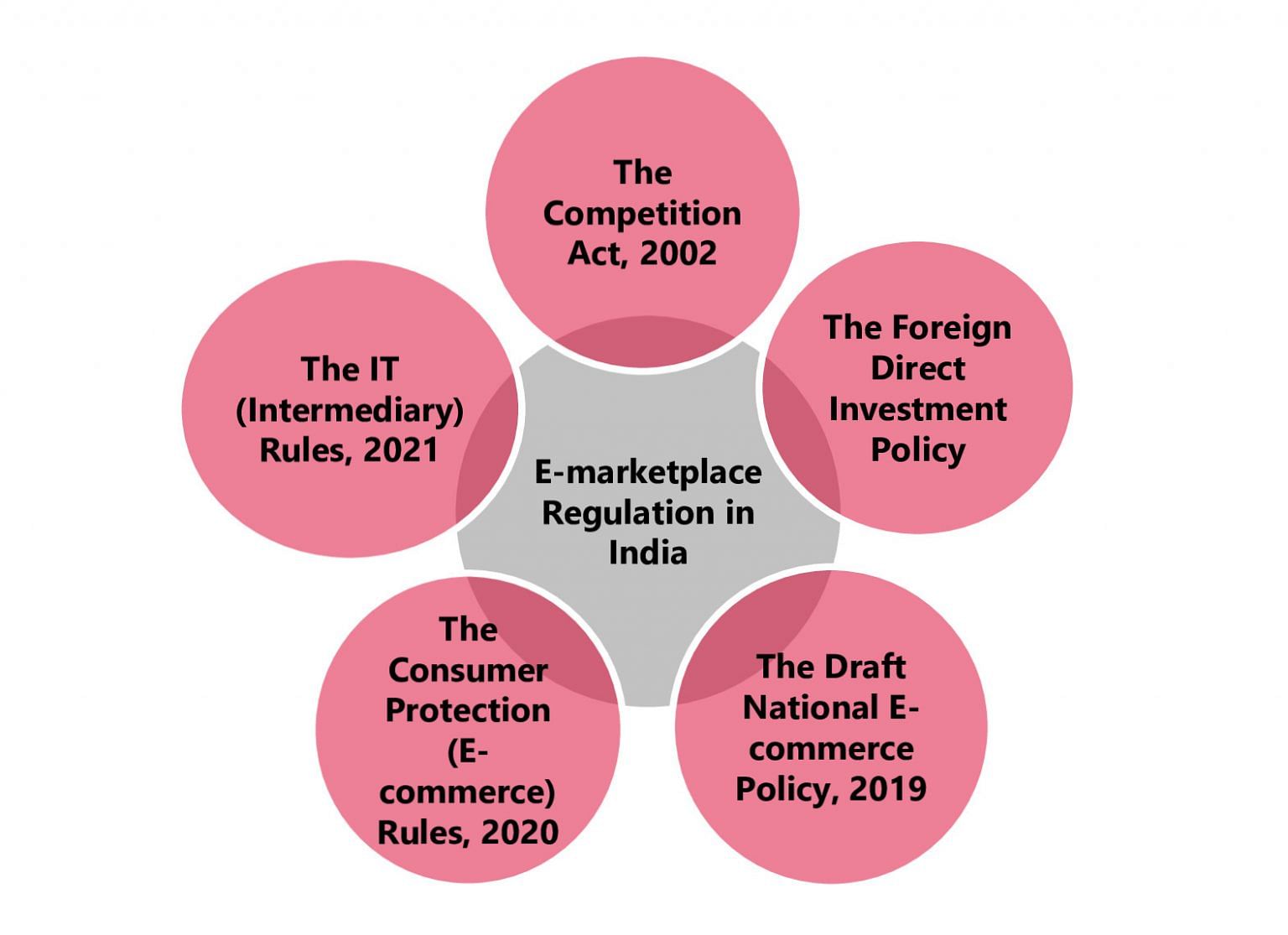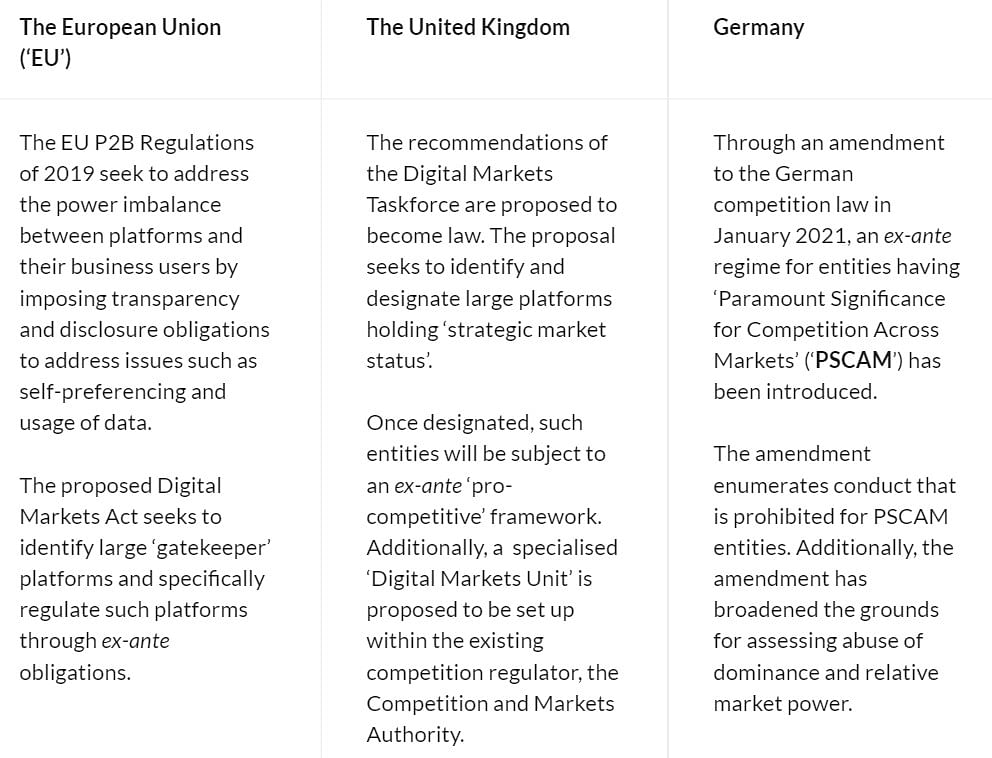Form of words:
IMarketplaces are at the forefront of the digital revolution in India and are undeniably important to the consumers and sellers/business users who operate on it. Presence on large digital platforms has become inevitable for business users to reach out to consumers due to the COVID-19 pandemic, even as some technology giants now act as ‘gatekeepers’ to various segments of the market.
However, the rise of e-marketplace in India has not been without problems. Several allegations of anti-competitive practices such as deep discounting, the self-preference of private labels owned by platform operators, and ambiguity regarding the use of search rankings, reviews, and data by their business users are routinely leveled against the platform. . The regulatory response to the issues arising between the platforms and their business users has so far been inconsistent and fragmented. Initially, e-marketplace regulation in India was subject to a light touch approach, considering its introduction. When regulatory attention finally shifted to the e-marketplace, consumer protection took precedence.
However, as we discuss in our working paper, pursuing a light touch approach in regulating platform-business user (‘P2B’) relationships may prove too short-sighted even by the consumer welfare standard. Further, it is highly undesirable to allow privately owned digital platforms, which lack democratic legitimacy, to set the rules for Indian e-commerce and mitigate the long-term risks and economic losses caused by them. .
The regulatory efforts should therefore focus on developing an ecosystem that can nurture a sustainable e-marketplace. To contribute towards this goal, our Working Paper seeks to provide a detailed assessment of existing as well as proposed P2B competition regulation in seven international jurisdictions that pave the way for a global regulatory response. Based on this, we seek to explore avenues for carefully calibrated solutions in the Indian context that balance the need to keep markets fair and competitive and foster innovation.
Current Indian Regulatory Scenario Governing E-Marketplace
Despite the existence of several statutory instruments (as illustrated), issues of P2B competition in e-marketplaces remain under investigation. For example, the Consumer Protection (E-Commerce) Rules, 2020 and the draft National E-commerce Policy, 2019 are primarily consumer-welfare centric and therefore have little impact on P2B competition regulation whereas Foreign Direct Investment Policy and Information Technology (Intermediary Guidelines and Digital Media Code of Conduct) Rules, 2021 are limited in their applicability as the former applies only to foreign funded entities in India, while the latter specifically mandates obligations on social media moderators, news publishers and news aggregators. does. The Competition Act, 2002 (‘The Competition Act’) empowers the Competition Commission of India to intervene ex post What is once legally demonstrable anti-competitive conduct, but it may not be sufficient in itself for the following reasons:
- First, if anti-competitive conduct does not trigger action under the statutory “abuse of dominance provisions” or the presence of an “anti-competitive agreement” cannot be established, reliance on the Competition Act alone may result in enforcement. Is.
- Secondly, investigations under the Competition Act are time and resource intensive. Meanwhile, the market may irrevocably tip in favor of the incumbent platform and consequently drive out competitors. The resulting loss is irreversible for both the market and the competitors.
As such, the statutory instruments that comprehensively set out the rules of the game east east To maintain fairness and competitiveness in the e-marketplace in India are absent.
Read also: Govt to revisit draft e-commerce rules as liability, grievance redressal norms to be withdrawn
International regulatory response to P2B competition issues
Similar regulatory trends aimed at strengthening east east Competition regulation with respect to platform giants can also be seen in Australia and China, where the regulatory focus is on promoting transparency and addressing the imbalance of bargaining power between platform giants and their business users.
Key findings of the working paper
- An emerging international regulatory consensus to selectively designate and regulate large digital platforms that act as ‘gatekeepers’ for certain segments of the market.
- the favorite modus operandi Such selective regulation of gatekeepers is complemented by east east Competition tools that help prevent certain unfair practices such as self-preference and anti-competitive leverage, enforce unfair contract terms such as most preferred nation clauses and exclusive sales, and promote transparency in the collection and use of consumer data collected To encourage.
- Strict scrutiny of mergers and acquisitions involving gatekeepers by introducing new core standards as well as new thresholds for assessing such mergers.
- Establishment of specialized enforcement and monitoring units within existing regulators or as a new authority to specialize and aid enforcement in rapidly evolving digital markets.
Based on our findings in this working paper, we believe that there is much to be gained by transitioning the existing regulatory approach to an e-marketplace. Increased competition and fair markets will not only spur innovation and encourage alternative platforms to come along, but will also allow small businesses and vendors to benefit more from the growth potential of the platform economy. Ultimately consumers will get benefit in the form of innovative and good quality products and services at affordable prices.
We would like to initiate an informed discussion between experts and stakeholders on the questions raised in the Working Paper. We hope this exercise will provide a good starting point for developing a regulatory framework that truly harnesses the potential of e-commerce for India.
Vedika Mittal is a Senior Resident Fellow and heads the Vidhi Center for Legal Policy in the area of Competition Law. Thoughts are personal.
Manjushree is Research Fellow (Competition Law) at RM Vidhi Center for Legal Policy. Thoughts are personal.
this article was first published Vidhi Center for Legal Policy.
subscribe our channel youtube And Wire
Why is the news media in crisis and how can you fix it?
India needs free, unbiased, non-hyphenated and questionable journalism even more as it is facing many crises.
But the news media itself is in trouble. There have been brutal layoffs and pay-cuts. The best of journalism are shrinking, yielding to raw prime-time spectacle.
ThePrint has the best young journalists, columnists and editors to work for it. Smart and thinking people like you will have to pay the price for maintaining this quality of journalism. Whether you live in India or abroad, you can Here.

